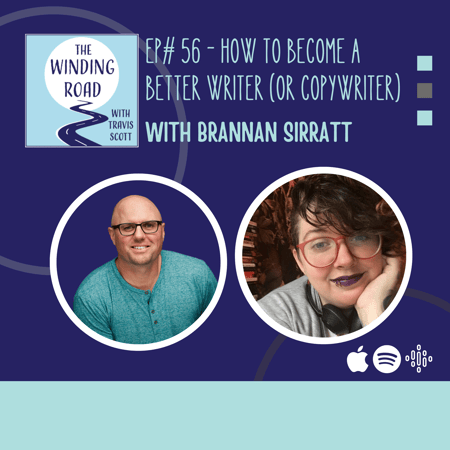Photo by Timothy Perry on Unsplash
Brannan Sirratt: How to Become a Better Writer (or Copywriter)

With the rise of AI and ChatGPT, is focusing on becoming better at writing still worth it?
Writing is in a weird place right now. All anyone wants to talk about is AI and ChatGPT. Will it replace writers and copywriters?
My short answer is: No
Copywriters are still a hot commodity in the world of marketing. There’s more demand than supply of good copywriters.
ChatGPT might help you write some copy, but you still have to understand the elements of what good looks like. You still have to understand the brand voice you’ll be using to convey your messaging and you still need to ensure that your writing -whether done by your, a bot, or both - transforms the audience in some way.
Even if AI wrote the music, there’s still a need for a conductor.
I interviewed Brannan Sirratt, who was the editor of my book, Think Differently: How Recruitment Marketing Get You Noticed Over the Noise, and we talked about four things that will make you a better writer (or copywriter)- even if you’re not the one doing the writing.
This article is especially for you if you’re considering a pivot into copywriting or writing. It might even offer some inspiration if you’re feeling stuck on how to make the transition.
How a Bad Job Lead to a Dream Career
First, I’m going to tell you a story about how life works in mysterious ways. How you can find gold in the darkest of places and how the opportunity to change our life trajectory is sometimes unexpectedly right in front of us- we just have to step out of the trees and have a look at the forest.
Brannan is an editor and former ghostwriter. Like I mentioned, she and I met when I realized I was in way over my head during the editing phase of the book I wrote.
She jumped in and saved me and I may not have ever finished it if it weren’t for her.
This is her story of how a call center job she never wanted became the catalyst to a fulfilling career in editing.
Brannan accidentally stumbled into her career as an editor early in her career and in the least likely of places.
She had recently graduated from high school and decided not to go to college because she didn’t know what she wanted to be when she grew up. She also found herself in a bit of a pickle - pregnant and in need of a job that offered the flexibility to work from home since she couldn’t afford daycare at the time.
This was in 2005, and working from home would not become an accepted and common thing for another 15 years.
Given her situation, she couldn’t be picky about what came her way, happened to be a “slimy,” “terrible” role working for a “grassroots” political organization that said they weren’t doing lobbying, but turned out they were doing lobbying.
Brannan started out in a call center role, eventually realizing she had more bandwidth to take on more and so she started to identify issues and pain points within the organization. One of those happened to be in the ghost-written letters they were writing on others’ behalf.
She had an untapped talent for interviewing and building trust quickly. “So I learned what kind of questions you ask to ghost really quickly and build trust really quickly on the phone. And I was coaching people in that direction,” she said.
Eventually, she went on to build a mentoring program within the business to teach people the systems she was putting in place and how to come into the company and be more than just a poorly paid cog. Many of those people have become friends and colleagues that she remains close with to this day.
Learn to Edit and Write to Voice
When it comes to marketing, one of the most in-demand skills right now is copywriting. The reason is that it’s hard and not everyone can do it.
The biggest challenge people have is learning to write and edit to voice. This means, the company or brand you’re writing for has a very specific voice they want to project to their audience. It’s as if the brand has a personality and, to be an effective copywriter, you need to learn how to identify that voice and then write using it.
It gets back to the old adage that if you want to be good at anything, you have to be a good listener first. You have to be able to shut your mouth long enough so you can see and hear the little details that make all the difference in the world to what you’re trying to do as a writer.
An interesting trick I learned when writing my book was to go back and read what I had written out loud. Did it sound natural? Was it how I would say it to someone if I were talking with them about the topic?
Voice and conversational writing doesn’t just apply to book writing, but probably even more so to writing great copy.
If you want to be a great copywriter, focus on listening more than writing.
How does the CEO talk about the company and your products? How do the sales team talk to prospective customers? What’s the culture at your company like and how can you translate that into words and how your writing makes your audience feel?
The Single Biggest Block People Have When Writing
Let’s face it, no one ever writes or says anything that’s unique. Everything that’s going to be said has already been said before.
This is what the voice in your head, the “Resistance” as Steven Pressfield refers to it as, is saying when you start to get serious about writing a book, starting a podcast, or even creating content for something like LinkedIn.
This misconception that you have to be ‘unique’ or come up with something new or different is what blocks the majority of people from ever having their voice heard.
Nothing that I write about or talk about in my podcasts is different from what other people, in the same space, have said or done. The difference is me. My voice is different. How I got here is different from the others. No one has my exact same experience. No one has had the exact same jobs I had at the same time I had them in the same decade, even, that I had them.
That’s why it’s worth speaking up. That’s why it’s worth writing.
There are also going to be people I’m for, people who like the way I talk about things on my podcast - sometimes a little salty, a little raw - or how I write (usually in the same way) and you know what, some are not.
Think of the best authors or writers in the world and then go read the reviews of their books. There will always be people who just don’t like them or their style.
(By the way, if you end up writing a book, never, ever read the reviews. That’s a bit of advice I got from Seth Godin and I am in full compliance and agreement.)
How to Find Your Own Writing Style
It’s no surprise that a lot of great writers are also avid readers. When you begin to take your writing seriously you start to have this desire to find your own style and your own voice- it goes back to the whole ‘unique’ thing.
The challenge, is that you can’t just come up with your own style out of the ether (because there’s no such thing as the ether). So, how have the best writers and authors done it?
Surprisingly, a lot of them found their own style while imitating other authors. It’s not uncommon for authors, early in their careers, to actually practice honing their style by literally writing what others have written, word for word, so they can get a feel for what it’s like to write that way.
They’ll do this for several authors whose style they admire.
When they’re reading, they’ll not only pay attention to what is written, but how it’s written.
When I wrote my book back in 2020, I was a voracious reader of everything Seth Godin had written. I was actively engaged in numerous workshops he lead and, if you read my book, you can probably find elements of his style coming through in my own.
Great Writing (and Copywriting) is All About Transformation
No matter if you’re writing a book, designing a workshop, or hosting a podcast, at the end of the day, you’re goal is to transform your audience in some way.
What is their beginning state before they consumed your book, article, workshop, or podcast and how are they changed when they’re finished?
What can they do now that they couldn’t do before?
This is what people are seeking and this is what you need to deliver if you want to be a successful writer.
Copywriting is no different because marketing is all about making change happen. Change as a copywriter can be making someone aware of your brand who wasn’t before. It can be changing their opinion of your company, brand, or product. It can be changing where they are in the buyer’s journey- maybe you’re helping them go from awareness and eduction to engaged.
It’s all about the transformation and you’re their guide, helping them get there through your content.
BONUS: How Writing a Book Can Supercharge Your Career Pivot
When you’re making a pivot, you’re likely leaving an area that you’ve gained a lot of experience, wisdom, and credibility into and now you see it as a bridge to this completely different thing.
The problem is, no one else can see the connection. So how do you articulate this?
Brannan mentioned that, “a pivot is a massive time that people are wanting to write a book because you have all of this experience in this other realm, so how do you communicate that ‘No, but really this thing I did over here is massively important over here’?”
Well, as she continued, “a book or a podcast or, you know, some kind of extended content that takes that credibility and repackages it - and not just credibility, but wisdom” is a great place to establish yourself in your new domain and demonstrate how you’re unique and what value you bring to the table.
If you’re not working for yourself, you can’t necessarily lay this out effectively in a resume.
This is another reason why you shouldn’t lead with a resume and you should focus more on building relationships that allow you to communicate these things in your own way and your own voice over time.
By keeping these things in mind, you'll be well on your way to becoming a better writer or copywriter. Even if AI becomes a bigger player when it comes to writing copy, exceptional companies will realize that it takes more than a reasonably smart bot to create copy that creates change in the reader.
Are you looking for a job and feel like you need some guidance? I offer new way of coaching using asynchronous voice messaging. If you'd like to tap into my experience of being a former recruiter along with my deep understanding of marketing careers, consider my 6- week coaching program.
-1.png?width=400&height=100&name=Website%20Logo%20-%20400x100%20(transparent%20background)-1.png)


